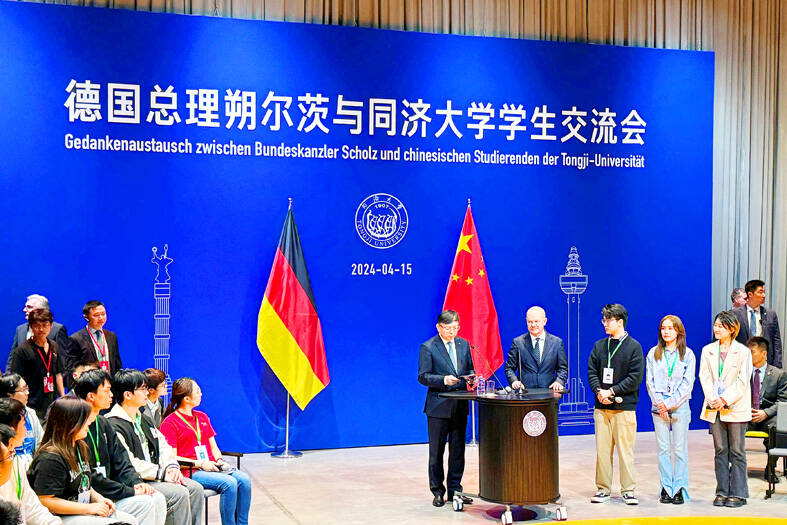German Chancellor Olaf Scholz yesterday instructed Chinese officials to promote free trade and equal business opportunities, a week after US Secretary of the Treasury Janet Yellen pressed Beijing on the same trade issues.
“Competition must be fair,” Scholz told an audience of university students in Shanghai, on the second leg of his four-day trip to the Asian nation.
“We want a level playing field, of course we want our companies to have no restrictions,” he said, identifying dumping, overproduction and copyright infringement as key areas of concern.

Photo: Reuters
Scholz is in China to deliver a delicate message: If Beijing does not heed European warnings to end discriminatory business practices, Brussels would have no choice but to escalate trade defense mechanisms.
A survey published on Wednesday last week by the German Chamber of Commerce in China showed that two out of three German companies operating in the world’s second-largest economy say they face unfair competition.
The survey results underscored concerns that foreign businesses in China suffer disadvantages compared with their local counterparts.
Scholz began his second visit to China as chancellor in the southwestern city of Chongqing on Sunday, where the German delegation raised the issue of Chinese overcapacity when meeting with Chinese Communist Party (CCP) Secretary of Chongqing Yuan Jiajun (袁家軍).
One participant of that meeting said that the Chinese side dismissed the German criticisms as “fake questions,” saying they were based on what CCP officials regarded as “fake news” or “false information.”
Last week, Yellen also implored Beijing to scale back its industrial output, saying that Chinese factories were producing more than the world could bear, and chided officials over the “unfair” treatment of US firms.
“We’re concerned about the possibility of surges in Chinese exports to our markets in areas where they have a great deal of overcapacity,” Yellen said in a CNN interview broadcast on Sunday.
“I’ve been very clear in my discussions with them that this is a concern not only to us, but also to other countries, to Europe, to Japan, and even to emerging markets. India, Mexico, Brazil,” she said.
Asked if additional US tariffs could be in the cards, Yellen told CNN’s Fareed Zakaria, “I wouldn’t take anything off the table as a potential response, but we really want to responsibly manage this relationship.”

SEASONAL WEAKNESS: The combined revenue of the top 10 foundries fell 5.4%, but rush orders and China’s subsidies partially offset slowing demand Taiwan Semiconductor Manufacturing Co (TSMC, 台積電) further solidified its dominance in the global wafer foundry business in the first quarter of this year, remaining far ahead of its closest rival, Samsung Electronics Co, TrendForce Corp (集邦科技) said yesterday. TSMC posted US$25.52 billion in sales in the January-to-March period, down 5 percent from the previous quarter, but its market share rose from 67.1 percent the previous quarter to 67.6 percent, TrendForce said in a report. While smartphone-related wafer shipments declined in the first quarter due to seasonal factors, solid demand for artificial intelligence (AI) and high-performance computing (HPC) devices and urgent TV-related orders

BYPASSING CHINA TARIFFS: In the first five months of this year, Foxconn sent US$4.4bn of iPhones to the US from India, compared with US$3.7bn in the whole of last year Nearly all the iPhones exported by Foxconn Technology Group (富士康科技集團) from India went to the US between March and last month, customs data showed, far above last year’s average of 50 percent and a clear sign of Apple Inc’s efforts to bypass high US tariffs imposed on China. The numbers, being reported by Reuters for the first time, show that Apple has realigned its India exports to almost exclusively serve the US market, when previously the devices were more widely distributed to nations including the Netherlands and the Czech Republic. During March to last month, Foxconn, known as Hon Hai Precision Industry

Taiwan Semiconductor Manufacturing Co (TSMC, 台積電) and the University of Tokyo (UTokyo) yesterday announced the launch of the TSMC-UTokyo Lab to promote advanced semiconductor research, education and talent development. The lab is TSMC’s first laboratory collaboration with a university outside Taiwan, the company said in a statement. The lab would leverage “the extensive knowledge, experience, and creativity” of both institutions, the company said. It is located in the Asano Section of UTokyo’s Hongo, Tokyo, campus and would be managed by UTokyo faculty, guided by directors from UTokyo and TSMC, the company said. TSMC began working with UTokyo in 2019, resulting in 21 research projects,

Quanta Computer Inc (廣達) chairman Barry Lam (林百里) yesterday expressed a downbeat view about the prospects of humanoid robots, given high manufacturing costs and a lack of target customers. Despite rising demand and high expectations for humanoid robots, high research-and-development costs and uncertain profitability remain major concerns, Lam told reporters following the company’s annual shareholders’ meeting in Taoyuan. “Since it seems a bit unworthy to use such high-cost robots to do household chores, I believe robots designed for specific purposes would be more valuable and present a better business opportunity,” Lam said Instead of investing in humanoid robots, Quanta has opted to invest